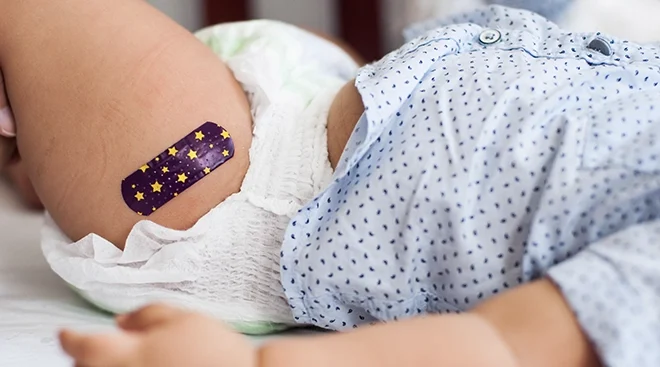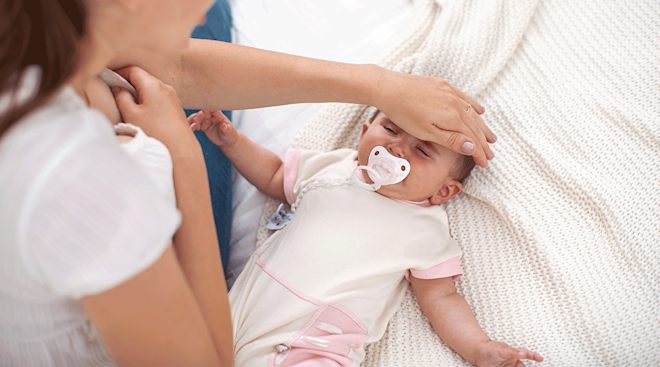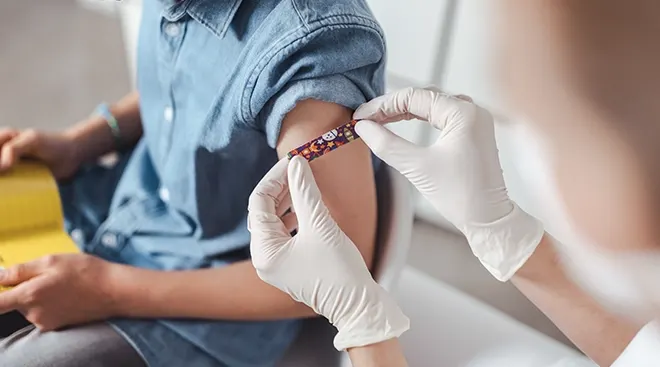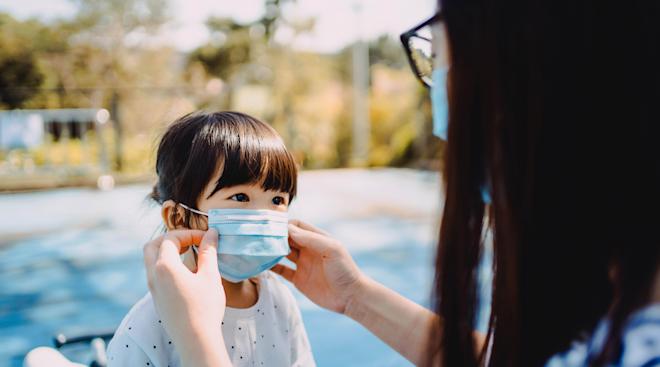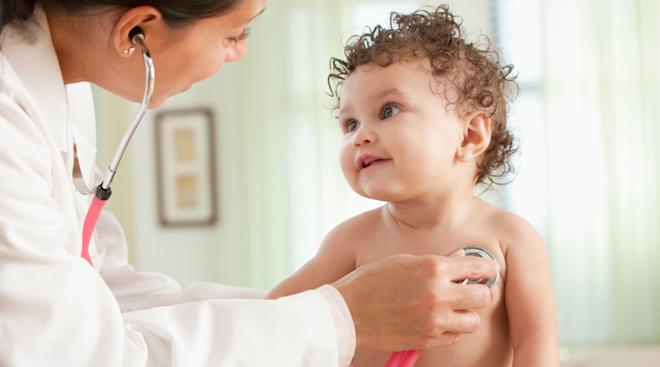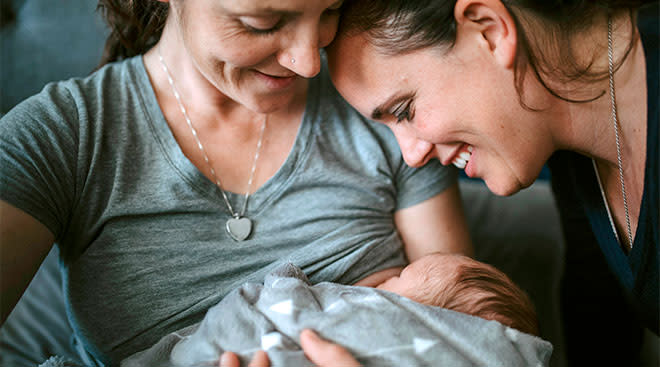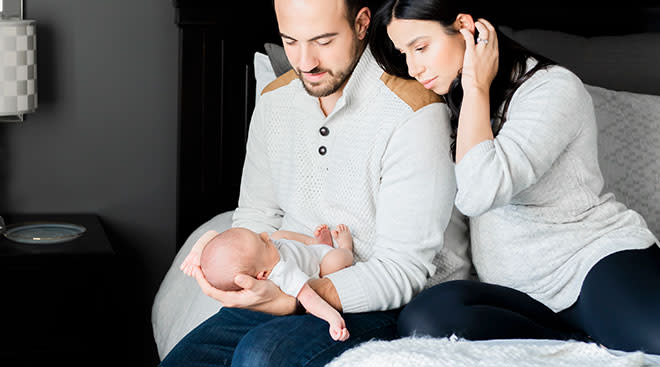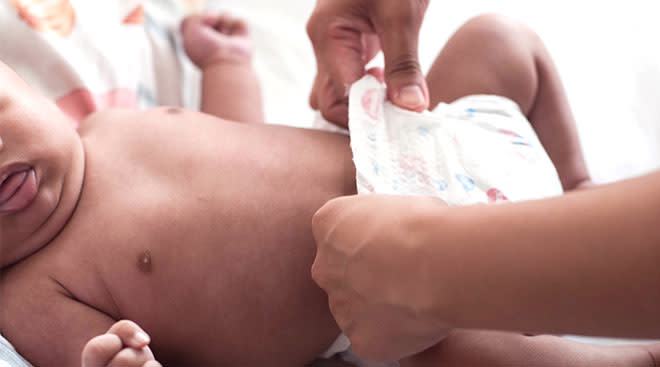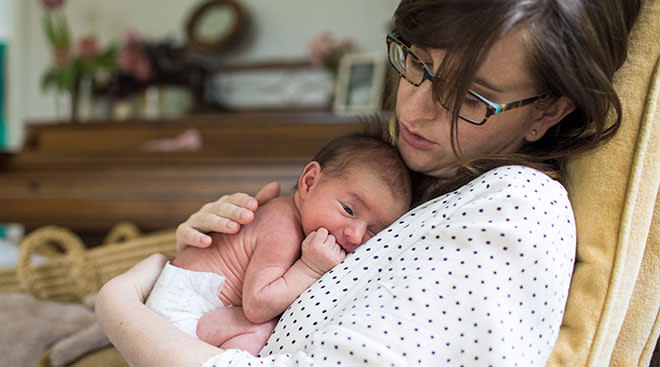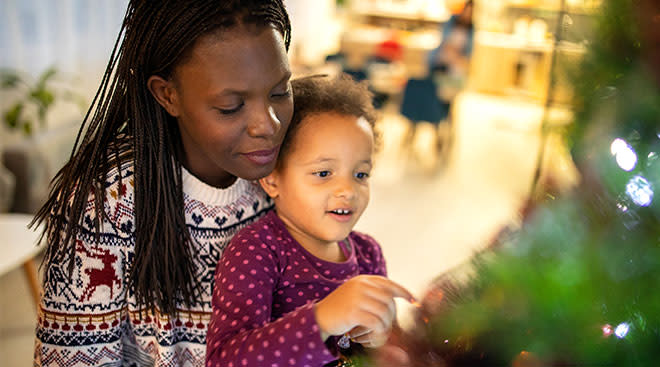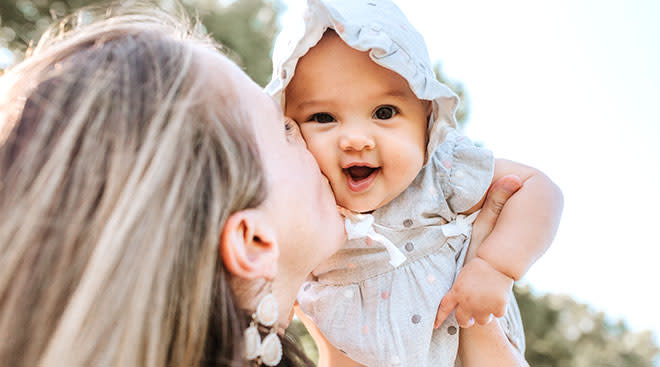Top Questions About COVID Vaccines for Babies and Toddlers, Answered
In June of 2022, the US Food and Drug Administration (FDA) granted emergency use authorization (EUA) of the bivalent Moderna and Pfizer-BioNTech COVID-19 vaccines for kids under 5 years old. These targeted the novel COVID-19 virus and its Omicron variant. For many, the news was long awaited—but since then some parents have been hesitant to get their child vaccinated. After all, with how quickly COVID protocols have changed, it’s only natural to still have questions and concerns. We reached out to pediatric experts and turned to medical authorities to answer the top questions parents have about the COVID vaccine for babies, toddlers and preschoolers. Keep reading for answers.
Since the onset of the pandemic, millions of kids under 5 have had a positive COVID test and thousands have been hospitalized, Amin says. Of those children, the Centers for Disease Control and Prevention (CDC) notes 824 have died. According to Parikh says, rates of transmission for this age group have been high, especially since it’s hard to get young kids to wear masks, socially distance and practice good hygiene. Johns Hopkins Medicine also cautions kids under 2 years and those born prematurely may be at higher risk for more severe cases of COVID-19. Plus, a small subsect of children have developed other conditions after COVID, such as pneumonia, ear infections and multisystem inflammatory syndrome in children (MIS-C), Amin adds. MIS-C can lead to inflammation in various organs and body parts and typically requires treatment in a hospital, the CDC says. To date, there have been over 9,500 confirmed cases of MIS-C and 79 fatalities related to MIS-C.
Unfortunately, while some treatments have been approved to treat COVID in adults, that’s not the case for children, Amin says. There are currently no FDA-approved treatments for COVID for kids younger than 5 years old. For MIS-C, the AAP notes there’s currently no “known optimal treatment,” rather patient care and treatment approach should be case by case.
It’s important to know that, as of September 2023, cases in kids aged 0 to 4 are on the rise again, the American Academy of Pediatrics (AAP) says. While the age group only accounts for 25 percent of the US population, they’ve accounted for 50 percent of COVID-based hospitalizations since June 2023. The reason? Low vaccination rates, the org says—only 13 percent of kids aged 0 to 4 have been vaccinated, compared to 68 percent of kids aged 12 to 17.
The initial bivalent vaccines approved for use in kids under 5 in June 2022 are no longer available. Instead, in October 2023, the US Food and Drug Administration (FDA) and CDC granted emergency use authorization for two updated Moderna and Pfizer-BioNTech vaccines for kids aged 6 months through 11 years that more effectively target current COVID-19 variants. While the vaccines are still only authorized for emergency use, the FDA maintains confidence in their safety, effectiveness and benefits based on extensive research.
Kids aged 6 months to 4 years who’ve had a previous vaccination can receive one or two doses of either updated vaccine, the FDA notes. Dosage will depend on age and each child’s COVID-19 vaccination history. Kids in this age group who’ve never been vaccinated should get three doses of the updated and authorized Pfizer-BioNTech COVID-19 vaccine or two doses of the updated authorized Moderna COVID-19 vaccine.
The updated vaccines utilize the same mRNA technology as the previous adult COVID-19 vaccine. The mRNA teaches our immune system how to make a “spike protein” that resembles the COVID virus, explains Preeti Parikh, MD, a New York City pediatrician and executive medical director at GoodRx, adding, “Your child’s body then makes antibodies against these spike proteins. If it encounters the COVID virus particles, the antibodies will attack the virus.” Children’s bodies destroy the mRNA in a couple of days but retain the knowledge of how to trigger an immune response, should they ever get exposed to COVID.
According to the CDC, like the vaccine for adults, the vaccines with EUA for kids under 5 do not contain a live virus. “It’s the same exact technology science as the vaccines for older children and adults, it’s just different dosing, depending on whether you get Moderna or Pfizer, compared to the adult population,” says Florida-based pediatrician Mona Amin, DO. The CDC also notes that kids will receive a smaller dose of the vaccine, compared to teenagers and adults.
The FDA believes the updated COVID vaccines for babies, toddlers and preschoolers will be as effective as the vaccines for adults.
In their initial trials, leading to the June 2022 approval of the initial vaccines for kids under 5, the experts looked at the antibody immune response triggered by the vaccine. They found the response in kids under 5 who had completed their doses to be comparable to adults who had completed their doses. The initial Moderna vaccine was found to be 50.6 percent effective in preventing COVID in kids 6 to 23 months old and 36.8 percent effective in kids 2 through 5 years old. According to Pfizer, its initial vaccine was found to be 80.3 percent effective in kids 6 months to 4 years old. “Both vaccines can prevent mild symptoms…but most importantly it prevents serious illness and hospitalization,” Parikh says. “The effectiveness should be similar to the older kids.”
For its updated vaccines, the FDA reaffirms its stance that both have gone through rigorous oversight and are safe for use. While the updated vaccine targets current variants circulating, Amin warns that it’s hard to concretely measure effectiveness, as new variants will continue to pop up. “It’s not that the vaccines aren’t great, it’s just that the variants could outsmart the vaccine,” Amin says—but this doesn’t mean that kids under 5 shouldn’t be vaccinated. The vaccine still provides the best chance for reducing the risk of getting COVID and becoming severely ill, Amin says, but parents shouldn’t believe their child can’t ever catch COVID after being vaccinated.
All major authorities on the subject believe the COVID vaccine to be safe for babies 6 months and up, toddlers and preschoolers. The FDA, CDC and AAP have all released statements based on the available data. All three organizations believe the vaccines are safe and will be effective at stopping the spread of COVID. “We don’t know all of the information, but what we do know is that it’s safe in trials and also in population data from children 5 and up that have been given the mRNA vaccine,” Amin adds.
According to AAP and CDC, the side effects for the updated COVID-19 vaccines are similar to previous formulations. The most commonly seen ones after administering the COVID vaccine in kids under 5 include:
- Fever
- Irritability or crying
- Soreness, redness and swelling at the injection site
- Sleepiness and fatigue
- Loss of appetite
- Swollen lymph nodes (usually in the underarm if administered in the arm, or in the groin if administered in the thigh)
- Chills
- Muscle aches or joint stiffness
- Headaches
- Nausea and vomiting
“These are symptoms that we see 48 hours after the vaccine, if they happen at all—not all children in the study have those side effects—and they went away on their own,” Amin adds.
The AAP does note that in the past there have been rare cases of anaphylaxis. There have also been extremely rare cases of myocarditis or pericarditis, which refer to the inflammation of the heart muscle and can be associated with symptoms of chest pain and irritability. However, the AAP notes these cases most often occurred in males aged 12 to 39. “I’m going to be honest, myocarditis is extremely rare in children under 5,” Amin says. “We don’t believe it’s going to be something very significant in this age group.”
Another concern parents may have is febrile seizures, which typically occur in younger kids and are triggered by fever. However, the CDC maintains that febrile seizures were rare in past clinical trials for young kids. Plus, as Amin points out, 3 to 5 percent of young children get febrile seizures, regardless of whether or not they’ve received the COVID vaccine or have COVID, the flu or another illness that’s causing a fever. “It could be that the child was prone to febrile seizures…Children with COVID infection can get febrile seizures, children with the flu can get febrile seizures,” she says. “It’s definitely not something that’s super concerning, but it’s something that parents should know.”
According to the CDC, anyone who currently has COVID or MIS-C should wait to get the vaccine until they’ve recovered and it’s been about 90 days since the diagnosis. The CDC also advises to talk to your child’s doctor if they’ve had an allergic reaction to any previous vaccine, are allergic to any of the COVID vaccine ingredients or have an allergic reaction immediately after getting the COVID vaccine. “If you have an allergic reaction to the COVID vaccine, then you should not be getting future ones,” Amin says. Other than these factors, Amin and Parikh say there are no known reasons that would prevent anyone in this age group from getting the vaccine.
Yes, experts recommend kids who’ve had COVID should still receive the vaccine, as it can help protect against future variants. While natural immunity is great, it’s not enough to protect against possibly aggressive new variants, Amin says. “This virus can outsmart us. The vaccine can add more protection than natural immunity.”
If your child is sick, first confirm it’s not COVID by getting them tested, Amin recommends. If the test is positive, the CDC recommends waiting three months (90 days) before getting your child vaccinated. Studies have shown that waiting three months after a positive test and then getting the vaccine can boost immunity, Parikh explains.
“If it’s not COVID, as long as that child is fever-free for 24 hours and is back to normal spirits, they can get the vaccine,” Amin says.
According to Amin, babies under 6 months aren’t vaccinated against viruses like coronaviruses or the flu. This is due to a lack of studies looking at safety, as well as the possibility of some immunity carried over from a mom who’s been vaccinated or had the illness during pregnancy, she explains. “Most vaccine studies similar to the flu are done for 6 months and over, once [baby’s] immune system is a little more mature.”
Ultimately, getting your child vaccinated against COVID is a personal decision. Amin’s biggest advice to parents considering whether or not their children should get the COVID vaccine? Do your due diligence, talk to your pediatrician, make an honest effort to learn about the science behind the vaccine and weigh the benefits and risks to make an informed decision.
Please note: The Bump and the materials and information it contains are not intended to, and do not constitute, medical or other health advice or diagnosis and should not be used as such. You should always consult with a qualified physician or health professional about your specific circumstances.
Plus, more from The Bump:
Preeti Parikh, MD, is a board-certified pediatrician at Westside Pediatrics of New York, based in New York City, and a spokesperson for the American Academy of Pediatrics. She also serves as an assistant clinical professor of pediatrics at Mount Sinai School of Medicine and the executive medical director at GoodRx. She received her medical degree from Columbia University and Rutgers Robert Wood Johnson Medical School and completed postgraduate training at the Mount Sinai School of Medicine.
Mona Amin, DO, is a board-certified pediatrician based in Florida. She is also the host of the PedsDocTalk Podcast. She received her degree from ATSU School of Osteopathic Medicine in Arizona, and completed her pediatric residency at the Bernard and Millie Duker Children’s Hospital in Albany, New York.
Centers for Disease Control and Prevention, COVID Data Tracker, October 2023
Johns Hopkins Medicine, COVID in Babies and Kids: Symptoms and Prevention, June 2022
Centers for Disease Control and Prevention, For Parents: Multisystem Inflammatory Syndrome in Children (MIS-C) Associated with COVID-19, January 2023
Centers for Disease Control and Prevention, COVID Data Tracker, October 2023
American Academy of Pediatrics, Multisystem Inflammatory Syndrome in Children (MIS-C) Interim Guidance, February 2023
American Academy of Pediatrics, COVID-19 hospital admissions among children rising again, September 2023
US Food and Drug Administration, FDA Takes Action on Updated mRNA COVID-19 Vaccines to Better Protect Against Currently Circulating Variants, September 2023
Centers for Disease Control and Prevention, COVID-19 Vaccine Emergency Use Instructions (EUI) Resources, October 2023
Centers for Disease Control and Prevention, Bust Myths and Learn the Facts about COVID-19 Vaccines, September 2023
Centers for Disease Control and Prevention, 6 Things to Know about COVID-19 Vaccination for Children, August 2023
Centers for Disease Control and Prevention, CDC Recommends COVID-19 Vaccines for Young Children, June 2022
American Academy of Pediatrics, COVID-19 Vaccine Frequently Asked Questions, October 2023
Centers for Disease Control and Prevention, Getting Your COVID-19 Vaccine, September 2023
Vaccine, Anaphylaxis rates following mRNA COVID-19 vaccination in children and adolescents: Analysis of data reported to EudraVigilance, March 2023
Centers for Disease Control and Prevention, COVID-19 Vaccine Safety in Children and Teens, July 2022
Centers for Disease Control and Prevention, Frequently Asked Questions about COVID-19 Vaccination, October 2023
Learn how we ensure the accuracy of our content through our editorial and medical review process.
Navigate forward to interact with the calendar and select a date. Press the question mark key to get the keyboard shortcuts for changing dates.

































